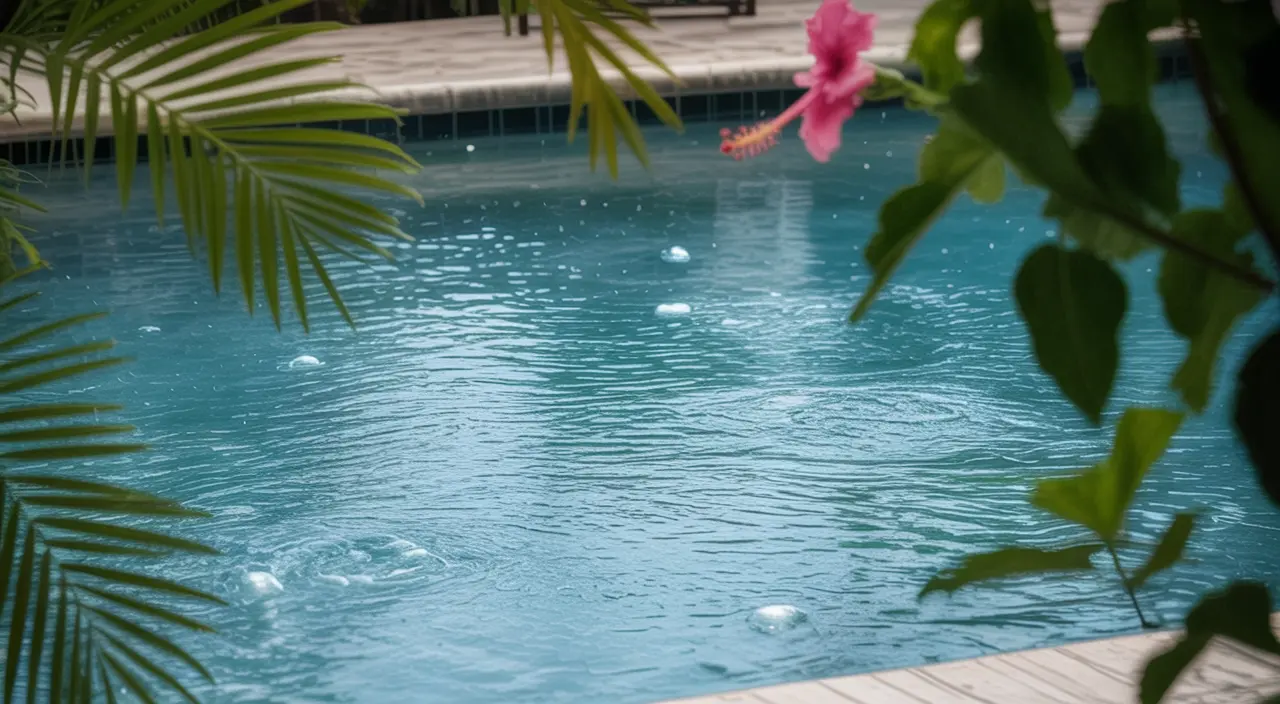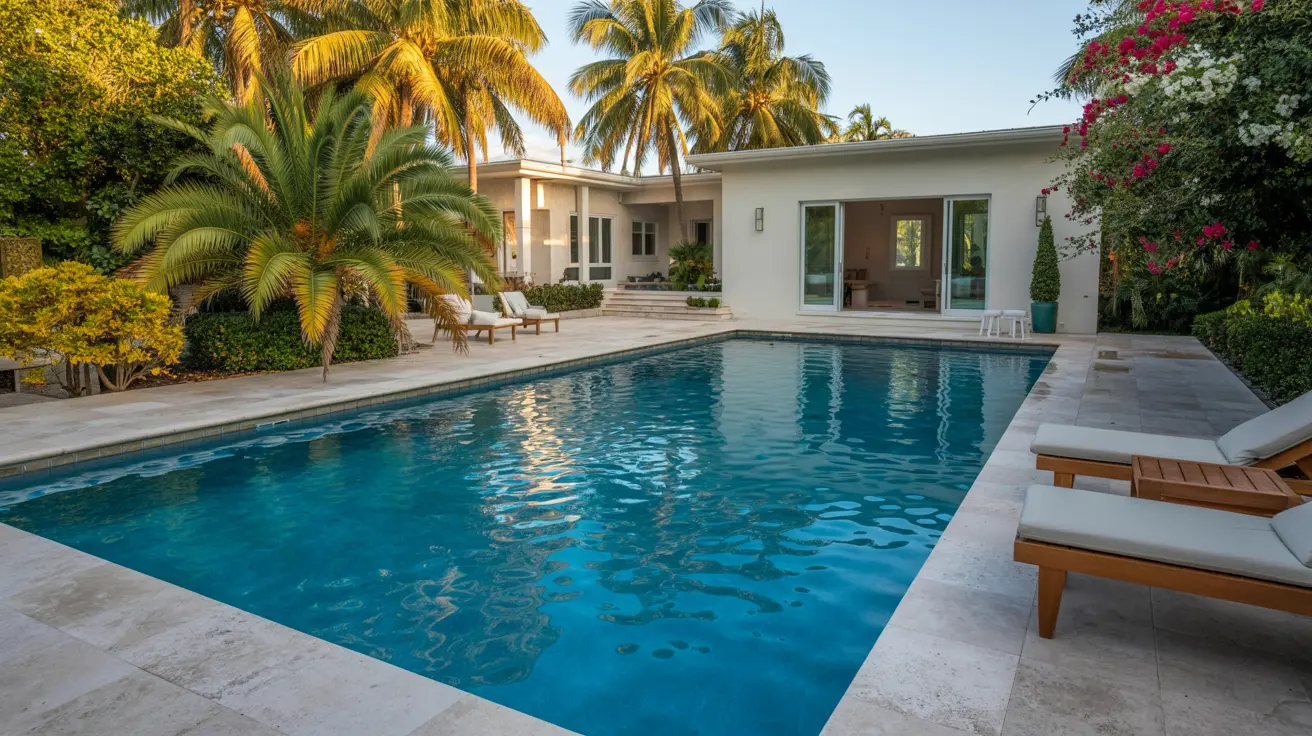Why is my pool the same after rain?
If you notice rain but pool level the same, you are not alone. Many times, a pool takes on rain, but the water level barely moves. The reasons are simple physics and how a pool works day to day in West Palm Beach.
- The pool is large. A bit of rain spreads across a big surface.
- Some rain leaks past the deck or into the landscaping.
- Evaporation and wind can offset rainfall the same day.
- The skimmer and drain pull water through the system, and that keeps the pool level stable.
At Gator Leak Detection, we see this often. Our team checks your pool, pump, skimmer, and drain to confirm all is normal or to find a hidden leak fast.
Does rainfall change the pool water chemistry?
Yes. Even when a pool looks fine, rainfall can shift the water balance. Rain is slightly acidic and adds dilution. That can lower ph levels, ph balance, and stabilizer. It can also reduce chlorine, which may open the door for bacteria and algae growth. Call Tobia Pool Care for help.
Simple steps:
- Test and adjust ph to protect the pool’s water.
- Add chlorine as needed after a rainstorm.
- Brush and skim the surface to remove debris and any alga.
- Run filtration to clear any contaminant.
“Rain affects your pool water even when the tile line looks the same.”
Could evaporation cancel out rain?
Absolutely. On a warm, breezy day, evaporation can remove water every hour. That can cancel out light rain. The net effect can be zero change in the water level even after a passing storm. In West Palm Beach, sun and wind vary, so the pool may lose as much water as the sky adds.
Should I run the pool pump and skimmer after a rainstorm?
Yes, run the pool pump and the skimmer. This helps with filtration and keeps the pool looking clear.
- Circulate to restore chemical balance.
- Vacuum and empty baskets to remove debris.
- Backwash the filter if pressure rises.
If you have a pool autofill, check it. It may mask a slow leak by adding water to your pool without you noticing.
How many inches of rain move the water level?
It depends on the volume of the pool and wind. A wide pool needs a lot of rain to rise even a fraction of an inch. For example, one inch of rain on a large pool may be just a few gallons of water relative to the total volume. If wind blows, downpours may not all land in the shell. That is why even heavy rain may not show a big change at the tile line.
What should a pool owner do after light rain vs heavy rain?
Use this quick guide for pool care in West Palm Beach.
Note: If you ever see overflow or high water at the coping, check the drain and deck flow. If in doubt, call Gator Leak Detection.
Can rainwater affects a leak test?
A brief shower will not stop us. We test for leaks in a swimming pool with pro gear that reads through noise. Even after rain, our methods isolate the source. If every time it rains you worry about a leak, we can confirm the cause, fast.
Could a leak still hide when the level looks normal?
Yes. A slow leak may hide if:
- The pool autofill keeps adding water to your pool.
- Dilution from rainfall masks small loss for a day.
- The loss rate matches wind-driven evaporation.
That is why many pool owners wait too long. Small leaks can negatively affect pool equipment, surface, and water balance over time. If you suspect a leak, Gator Leak Detection is your local pro in West Palm Beach.
Simple checklist after rainfall
- Check your water with a quick strip or meter.
- Adjust ph and chlorine to restore balance.
- Empty baskets; remove debris.
- Verify pump and filter are running well.
- Inspect the skimmer weir and drain covers.
- Look for wet spots near the deck after storms.
- Note the water level at the tile line for two days.
“Test water every week, and after storms.” That habit will keep your pool on track.
Light rain vs. downpours: What’s the risk?
- Light rain: Minor dilution, small chemistry tweaks.
- Big downpours: More dilution, possible deck wash-in, and more contaminants.
- A wind-driven rainstorm may push much water out of the basin. That is why the level can look fixed after a wild night.
If you see discolored water in the pool or drifting stabilizer and chlorine levels, call us. We can help restore chemical balance and confirm if a leak is present.
How Gator Leak Detection helps West Palm Beach
We’re Gator Leak Detection, your local team for fast, precise diagnostics. We help a pool owner understand why the water level seems steady after rain, and we find the truth if a leak is hiding.
- Electronic leak listening and dye tests
- Pressure testing of lines and fittings
- Skimmer, main drain, and return inspections
- Repair guidance and next steps
We also offer a free pool school to help you keep your pool tuned between visits. We explain ph, water chemistry, and simple pool maintenance so you can keep your pool clear and safe.
Pro tips to keep your pool leak-free
- Confirm the pool’s water level at the same time each day.
- If you suspect a leak, turn off the pool autofill and re-check in 24 hours.
- Watch for soft spots near the deck or along plumbing lines.
- Make sure the drainage system around the pool routes water away from the shell.
If you need us, Gator Leak Detection is ready to help your pool like new again.
Quick science corner
- Rain is slightly acidic and can lower ph.
- Dilution and splash-out change the chemical balance even if the tile line looks steady.
- Algae growth can follow if chlorine dips.
- A single storm can change the water balance without moving the level.
FAQs we hear in West Palm Beach
- Do I need to drain after a storm? Usually no. Call us before any drain plan.
- Can stabilizer help after a wet week? Yes, test first, then dose if low.
- Should I upgrade filtration? A clean filter and sound pump help keep your pool stable in our climate.
.webp)




